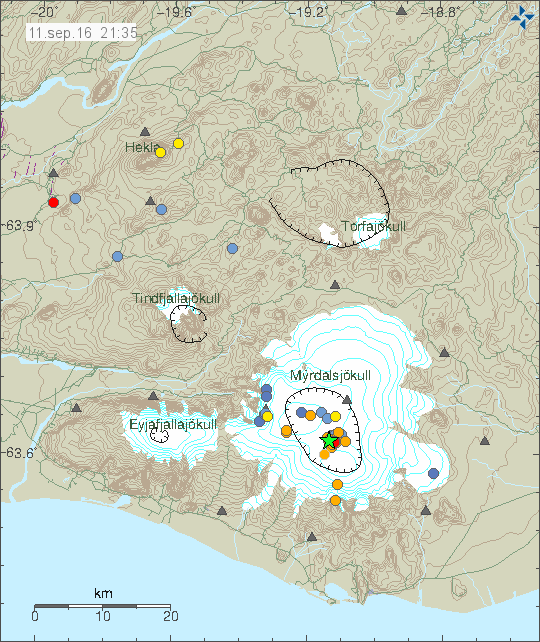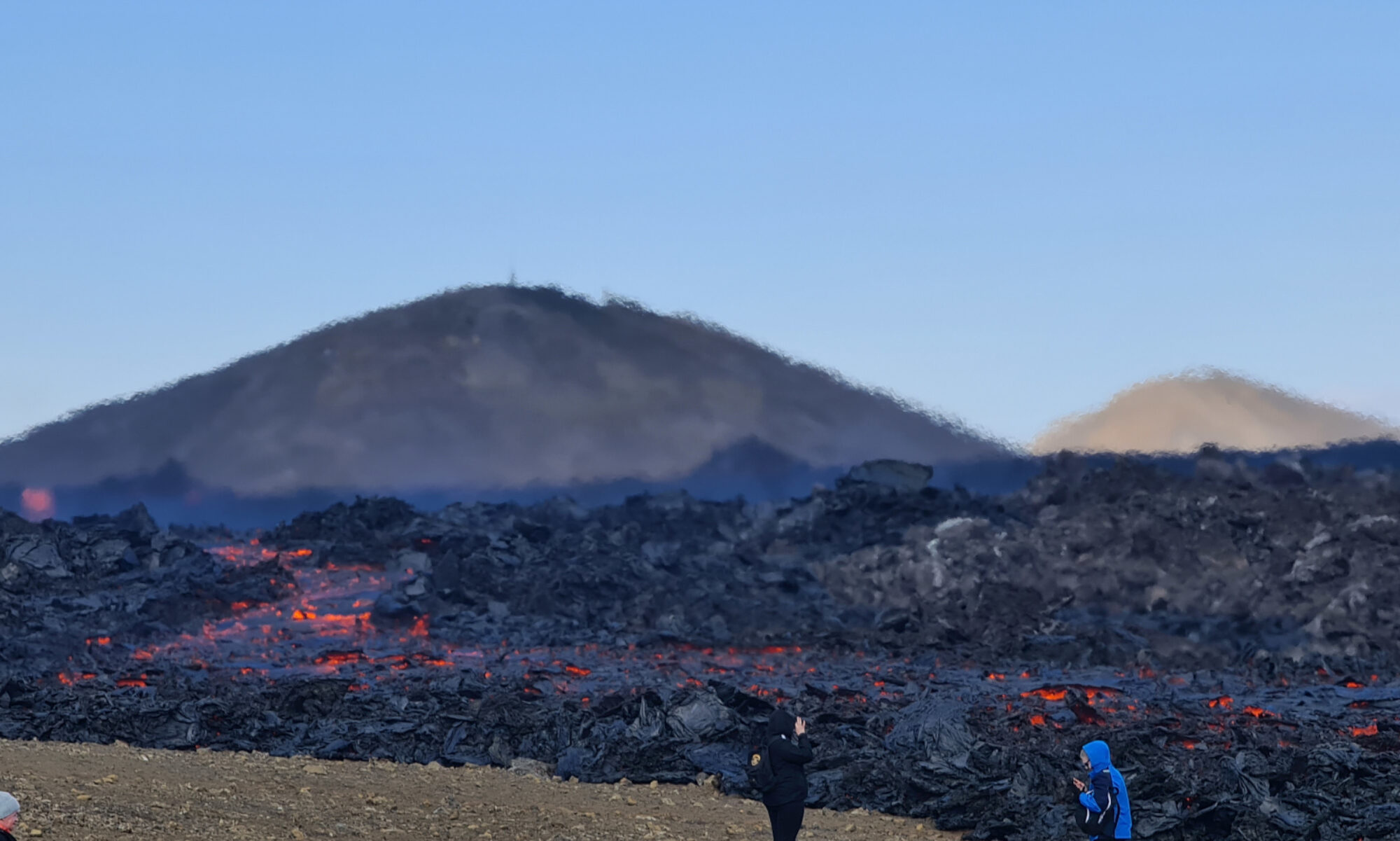Today at 12:19 UTC an earthquake swarm started in Katla volcano. This has been mostly normal earthquake activity for Katla volcano, with earthquakes that are small in magnitude and most not reaching magnitude 2,0. Largest earthquake took place at 15:57 UTC and was a magnitude 3,0 and at magnitude 16:12 UTC and had the magnitude of 3,3.

The earthquake activity in Katla volcano. Copyright of this image belongs to Icelandic Met Office.
It is difficult to know if this earthquake activity was due to change in hydrothermal systems that exist in this area or due to magma or gas pressure changes. No harmonic tremor changes have taken place following this earthquake activity. Since the largest earthquakes happened the activity has quieted down considerably. This earthquake activity or a new one might start without warning in Katla volcano.

I notice that the depth of the 3.3 mag quake in Myrdalsjokull is given as zero in the Met Office earthquake table. Any significance to this?
The depth being listed as zero may mean that the earthquake happened at sea level. What is the elevation of Katla?
Katla is 1512 meters in elevation above sea level. There, I answered my own question.
This means the earthquake happened at 0 km depth. Not sea level.
Details here, https://youtu.be/q65O3qA0-n4
So then Jon, 0 km depth is where in relation to the top of Katla?
Yes, that is the measurement used. You can find some information about Katla caldera floor in this study.
https://notendur.hi.is/~mtg/pdf/2000Jokull49_HBetal_Myrdalsjokull.pdf – Its from the year 2000.
When I see Katla comparing to Eyja it is such a beast! it would be huge if something happens.
Even the biggest eruption of Katla was a mere fart compared to Mt. Tambora 1815
For those who are interested Le Piton de la Fournaise, Ile de la Reunion is erupting:
http://www.ipgp.fr/fr/ovpf/actualites-ovpf
http://www.fournaise.info/
You can see it here
End of summer melt water priming hydro-thermal farts. I’ll get excited when Jon starts talking about magma but we can wait more than a life time anything significant to happen under all that ice.
The problem is that we never know which lifetime. 1918 was the last time and that is 98 years ago. Statistics also tell us that Katla erupts every fifty years on average. And it is a significant connection to eruptions in eyjafjallajokull. You know 2010. Say no more………
One should not overlook the Katla eruptions of 1955, 1999 and 2011. Just because these eruptions weren’t strong enough to break the ice cap doesn’t mean they did not happen.
The 2011 subglacial eruption of Katla swept a 134 meter long bridge from its foundations.
When I walked on that bridge I wondered why the road led to the ocean, till I suddenly realized that it was the dissappeared bridge I was walking on! What a power those forces of nature have!
In 2 weeks time the Icelandic authorities built a replacement wooden bridge which carried all (!) traffic. A remarkable piece of engineering!
Yes Z that is true. But we can assume that there has been many many of these minor eruptions that has gone unnoticed during the past past centuries due to lack of equipment and surveillance.
It is 50- 100 years between large eruptions.
You are right, of course, Jonas. But because of the lack of historical data, we can only speculate.
Another little swarm with largest quake having a magnitude of 2.6:
Wednesday
14.09.2016 11:26:19 63.659 -19.148 0.1 km 2.6 99.0 5.4 km ENE of Goðabunga
New analysis method for magma buildup in Aira caldera, Japan.
https://www.sciencedaily.com/releases/2016/09/160913095901.htm
http://www.nature.com/articles/srep32691
Good read.
I myself accidentally stumbled into some articles about the ‘invisible hand’, tectonic ( magma traveling below the surface on a collision course up a rifting fault) triggering and modulation of an eruption. Or to know when a large eruption (like BB) has truly stopped. Nowadays new radar techiques are available to study ground motions better than before to monitor potential ‘danger zones’ in surprising places.
http://www.stuff.co.nz/dominion-post/news/6784815/Taupo-super-eruption-secrets-revealed
http://ir.canterbury.ac.nz/handle/10092/9319
http://www.nature.com/news/zombie-volcano-slowly-grows-beneath-new-zealand-1.20023
Earthquake warning about SISZ. Something seems to be going on there. I’ll look at it in a moment. First I have to go the store before it closes down.
Interesting little cluster Jon!
What do you make of Grimsjall tremor graph just now?
http://hraun.vedur.is/ja/oroi/grf.gif
Magnitude of the quakes is increasing in this area. Now a 1.9.
Looks like Bardarbunga is awake again:
Thursday 15.09.2016 04:19:58 64.659 -17.471 2.4 km 1.6 99.0 3.4 km NE of Bárðarbunga
Thursday 15.09.2016 04:17:28 64.613 -17.484 4.4 km 1.7 40.95 3.7 km SE of Bárðarbunga
Thursday 15.09.2016 04:14:54 64.679 -17.458 3.1 km 3.5 99.0 5.5 km NE of Bárðarbunga
Thursday 15.09.2016 04:13:48 64.689 -17.380 3.8 km 1.6 61.67 8.9 km NE of Bárðarbunga
Normal activity. This type of swarm activity in Bárðarbunga volcano happens once a week. If I wrote about it every time I would not write about anything else.
Tropical storm Ian is going to pass over Iceland in the next 24 hours. A lot of rain is expected in south and east Iceland.
https://www.wunderground.com/hurricane/atlantic/2016/Tropical-Storm-Ian
EQ swarm right now.
Saturday
17.09.2016 08:22:08 64.058 -21.417 4.6 km 2.7 99.0 2.5 km NNW of Hellisheiðarvirkjun
Saturday
17.09.2016 08:15:28 64.059 -21.416 4.4 km 2.5 99.0 2.6 km NNW of Hellisheiðarvirkjun
Saturday
17.09.2016 08:05:54 64.057 -21.419 4.6 km 2.2 99.0 2.4 km NNW of Hellisheiðarvirkjun
Saturday
17.09.2016 08:04:33 64.058 -21.417 4.6 km 2.6 99.0 2.5 km NNW of Hellisheiðarvirkjun
http://en.vedur.is/earthquakes-and-volcanism/earthquakes/reykjanespeninsula/
Hellisheiðarvirkjun is a major geothermal plant; those quakes are associated with the reinjection of hot water back into the hydrothermal system. Regular occurrence around there.
I thank it was Coldplay water they injecteren.
Ik know back then when Carl from VC was still commenting here that what thee were ding there was highland dangerous, because pumping hot water in or close to a magma chamber could trigger an eruption in the nearby volcano and could pose a threat to Reykjavík.
Ik think it was cold water they injected (and then the rest of my reply; stupid smartphone!)
I’ll write about this tomorrow. I needed a break from writing about earthquakes a volcano (at least a day).
Sunday
18.09.2016 08:04:18 64.058 -21.422 4.4 km 3.1 99.0 2.6 km NNW of Hellisheiðarvirkjun
Sunday
18.09.2016 05:30:46 64.049 -21.419 4.4 km 2.8 99.0 1.7 km NW of Hellisheiðarvirkjun
http://en.vedur.is/earthquakes-and-volcanism/earthquakes/reykjanespeninsula/
They must be pumping quite alot of water at Hengil with the eq swarm it’s produced.
Sunday
18.09.2016 20:42:51 64.616 -17.417 1.1 km 3.2 90.12 5.9 km ESE of Bárðarbunga
http://en.vedur.is/earthquakes-and-volcanism/earthquakes/vatnajokull/
Sunday
18.09.2016 20:42:51 64.627 -17.475 5.5 km 3.8 99.0 2.9 km ESE of Bárðarbunga
And the 3.8 was followed by this one
Sunday 18.09.2016 20:45:52 64.622 -17.416 2.4 km 1.6 99.0 5.7 km ESE of Bárðarbunga
and Katla keeps its low rumble up with :
Sunday 18.09.2016 18:04:03 63.648 -19.218 2.4 km 1.3 90.01 1.8 km ENE of Goðabunga
Another one:
Sunday
18.09.2016 22:03:41 64.627 -17.403 4.4 km 3.7 99.0 6.1 km ESE of Bárðarbunga
http://en.vedur.is/earthquakes-and-volcanism/earthquakes/vatnajokull/
Earthquake activity in Hengill volcano is going up and there is no point for me to write about it at the moment. Since it would go outdated almost soon as I finished it.
Looking into writing a article about Bárðarbunga volcano.
A 3.6 near the power plant, didn’t expect that!
Also a similar depth to Bards 3.7EQ 26 mins earlier (Bard 4.5km depth)
No I don’t think they are related before anyone says anything!
You mean there not even kissing cousins ?
this was boring
M3.8 in Katla caldera at 13:31. Very shallow.